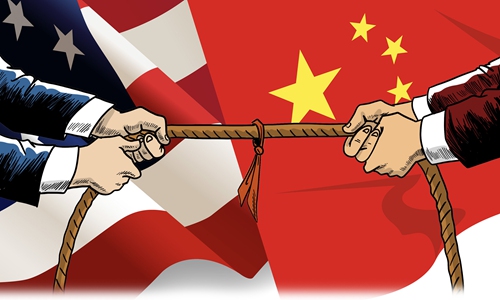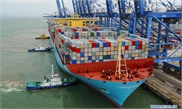How China can gain from trade headwinds

Illustration: Luo Xuan/GT
"US-launched trade war against China is turning into a protracted one, but we have been prepared," Yang Jinghui, chairman of a technology company in Hongmei, a town of Dongguan in South China's Guangdong Province, told me. As over half of the products that his company makes are sold to the US, his business has been deeply influenced by the tariffs slapped by the superpower. However, what I saw was his optimism and positivity, instead of anxiety and despair.This was the fourth time I did field research in the Pearl River Delta over the last half a year, during which I met dozens of business owners. Like Yang, the majority of them were busy negotiating with US importers, and attempting to offset the negative effects of tariffs imposed by US President Donald Trump by either improving technology, or opening up a broader international market.
Dongguan is home to 25 percent of smart phones, 20 percent of sweaters, 30 percent of toys and 10 percent of glasses and trainers in the global supply. The impact that the China-US trade frictions have had on it is considerable. The situation in Dongguan reflects what Chinese enterprises are undergoing amid the ongoing trade spat.
Dongguan's value added of industries above designated size expanded 6.8 percent year-on-year between January and July 2019, and the rate for import and export was 4.4 percent, much higher than the national level. It's a mixed blessing for firms in Dongguan in the context of a complex situation at home and abroad. The value added of advanced manufacturing and high-tech manufacturing sectors above designated size grew at 10.4 percent and 17.3 percent respectively. The year-on-year growth rate of the electronic and information technology sector reached 17.8 percent. But the textile, clothing, footwear, headwear manufacturing sector witnessed a negative growth, dropping by 3 percent. And the papermaking and paper product sector declined by 0.7 percent.
A senior executive of Huaqin Communication Technology Co Ltd, the world's leading multi-category intelligent communication terminal R&D design company, said that in the era of 5G, US technology is not superior and cannot beat Chinese enterprises. Chinese mobile phone companies have plenty of alternatives. But he admitted the production and sale of laptops may be more deeply affected due to the impact on chip technology.
In the middle of August in 2019, a survey of 587 key enterprises in Dongguan shows that after US imposed 10 percent tariffs on another $300 billion worth of Chinese goods, 24.6 percent of companies held it would not affect their order volume, 34.3 percent anticipated a slight drop (within 10 percent), and only 6.5 percent thought of a severe slump (over 30 percent).
"The tenacious character of people in Dongguan determines there must be a way out in spite of difficulties." Jiang Bo, a lecturer in charge of training local entrepreneurs, said. "Trump's attempt to utilize the trade war to achieve a quick victory over China totally failed in front of Dongguan entrepreneurs."
In Shenzhen firms such as DJI and Hytera, I also came across the determination of many business people. In the Shenzhen Stock Exchange, 60 percent of investors believed the trade war would last for a long time.
Eighty percent of respondents said they would take trade war into consideration when making investment decisions, but only one-third of them chose to sell stocks.
In China (Guangdong) Pilot Free Trade Zone Qianhai & Shekou Area of Shenzhen, the average growth rate of registered enterprises hit 62.7 percent between 2012 and 2018. In the first half of 2019, the value added of registered enterprises in the area increased 19.3 percent, the tax revenue achieved 23.7 percent growth and the actual use of foreign capital rose by 12.1 percent. Up to 2019, the number of companies from Hong Kong, Macao and Taiwan which Qianhai had nurtured reached 190.
Based on my research, I found the China-US trade war has had a diverse impact on different industries. Sectors such as finance, energy and raw materials have been hit, while the industries like consumption, information technology and telecommunications, and healthcare are hardly affected.
China and the US signed a phase one agreement related to the trade war on Friday. It has been widely discussed who the winner is. According to the results of my research, I believe that China has not lost, nor has the US won. It is too early to draw a conclusion.
However, if China can weather the test of the trade war with the US, improve the quality and efficiency of development, accelerate the impetus for reforms, tackle the vested interests and institutional shortcomings and reap the benefits of a new round of reform and opening-up, the trade war is not a curse, but a blessing.
The author is professor and executive dean of Chongyang Institute for Financial Studies, the deputy president of Silk Road School, Renmin University of China. His book Great Power's Long March Road was launched recently. wangwen2013@ruc.edu.cn



